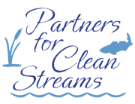 Learn how you can keep e. coli out of our water just by picking up pet poo and by not feeding nuisance waterfowl. Reducing this waste adds up to make a major difference for our waterways.
Learn how you can keep e. coli out of our water just by picking up pet poo and by not feeding nuisance waterfowl. Reducing this waste adds up to make a major difference for our waterways.
A 1993 US EPA study showed that 95% of fecal coliform found in urban separated storm water was of non-human origin. The connection between clear, clean and safe water and pet waste might not be obvious, but that doesn’t mean it’s trivial. Let’s take a look at the numbers provided by Clear Choices, Clean Water:
• About 47% of U.S. households have at least one dog
• That means there are approximately 53 million pet dogs in the U.S.
• Each of those 53 million dogs produces about 0.75 pounds of waste every day
• That equals about 400 pounds of poo every year for every household… or about 6.3 BILLION pounds nationally.
What happens to all that waste? After all, it would fill a space the size of a football field about 800 feet high. Believe it or not, pet poo left in a yard takes somewhere between three months and a full year to decompose, depending on temperature and weather conditions. That means that if pet poo isn’t picked up, rain will wash it away into storm drains, ditches, rivers, and eventually into Lake Erie. Ultimately, the waterways where we play and get our drinking water suffer from excess waste, and that waste is filled with bacteria like E. coli.
Ducks and geese are another source of E.coli-producing excessive waste in our waterways. These animals may seem like a beautiful natural part of a lakeside environment, and in small numbers, they are! However, large waterfowl populations fed by humans and encouraged by landscapes to stay in one place for long periods of time can cause problems.
These large wildfowl populations leave a lot of droppings behind. For example, a single Canada Goose eats 3-4 pounds of grass and can create as much as 2-3 pounds of waste per day! Between their heavy grazing of grass and significant amounts of waste, a large flock of geese can make a backyard or park a very unpleasant place for people to spend time. These droppings are not only unsightly, they can also make people sick, adding nutrients and bacteria to our waterways.
Fortunately, solutions to these problems are easily implemented! For deterring ducks and geese, in addition to not feeding these animals, keep vegetation higher around ponds; they think there’s predators hiding there. There are also services for hire where trained herding dogs chase geese away from shorelines.
You can commit to making a difference take a pledge through Clean Choices, Clear Water to Pick Up Pet Poo and to Deter Waterfowl.
